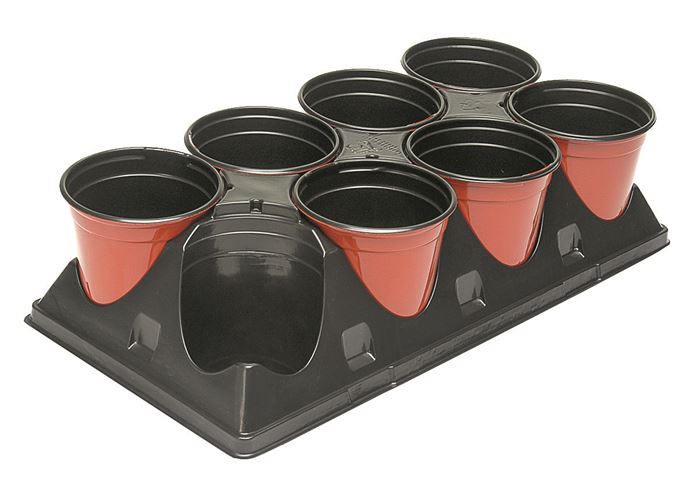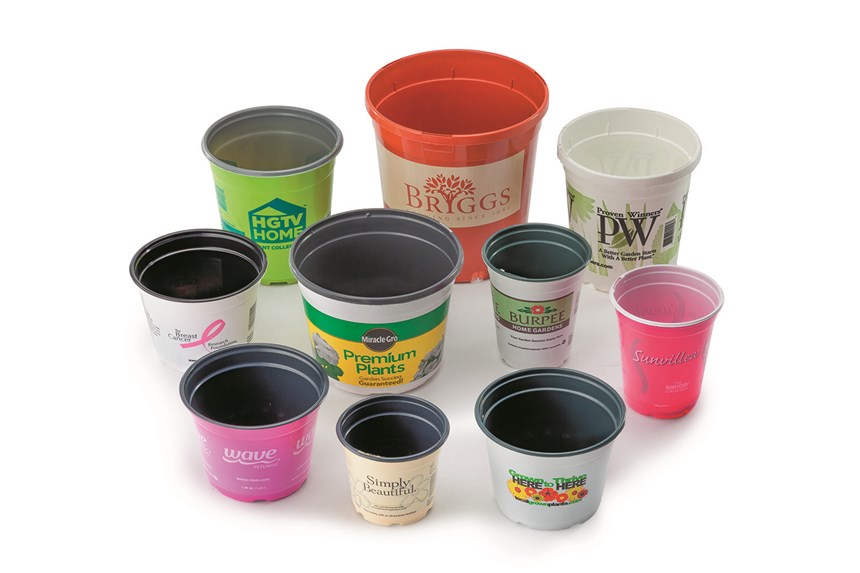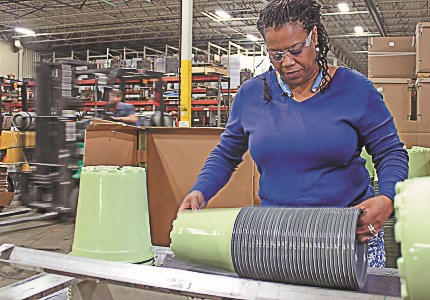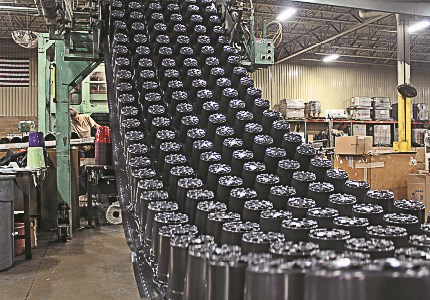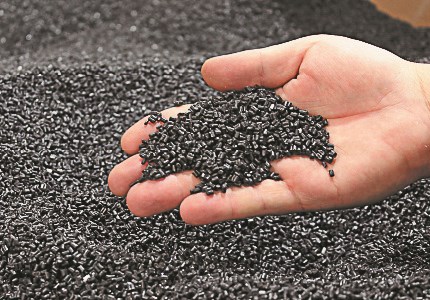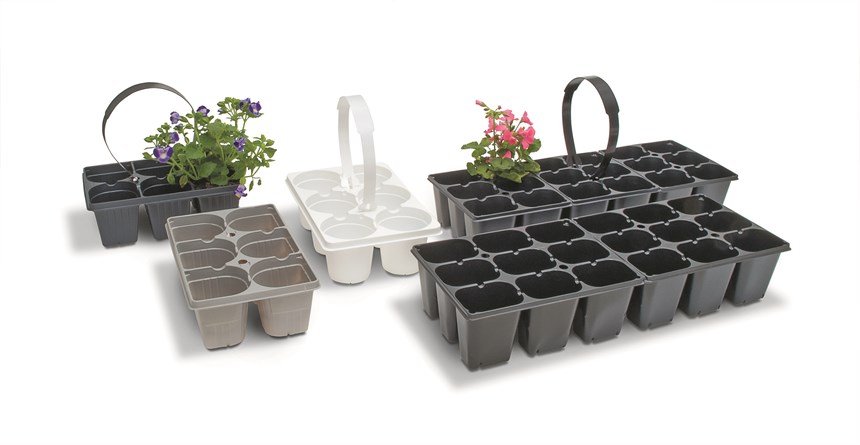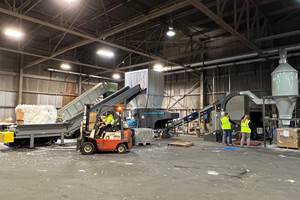Processor Cultivates Success With Recycled Plastics
Landmark Plastic produces packaging and other products for the horticultural industry, using not only its own scrap, but reclaim it collects from growers and retailers.
Not far from the home of basketball legend LeBron James and right next door to the massive Goodyear Airdock, a family-owned processor has found a niche by using millions of pounds of recycled plastic annually to produce products for the horticulture industry. The company designs, manufactures, and distributes a proprietary line of thermoformed and injection molded plant packaging products—from trays, packs, and flats to hanging baskets and decorative pots.
That horticulture market consists mostly of greenhouse growers and retailers, including traditional big-box stores and garden centers. Steven Merzweiler, president and COO of Akron-based Landmark Plastic Corp., says his company services greenhouse growers in North America and has strong relationships with the top 100 growers.
Founded in 1984, Landmark has manufacturing, warehousing, and distribution facilities at its 200,000 ft2 headquarters in Akron, where it employs about 150 people.
HORTICULTURAL PLASTICS DNA
You can say the combination of plastics and horticultural packaging is in the Merzweilers’ DNA. It all started when Leo Merzweiler founded his first plastics company in 1954, and as a plastics and horticultural packaging innovator, he devoted his entire career to both industries. The family’s thermoformed product innovations continued with his son, Bob, and the establishment in 1984 of Landmark Plastic. The two saw a need to provide plastic packaging for the growing horticultural industry that was starting to make its mark in garden centers and big-box retailers.
Bob Merzweiler, Landmark’s chairman and CEO, in addition to his role founding the company, has had extensive involve- ment in many industry and community organizations, including being a founding member and past president of PolymerOhio and a member of the Processor’s Council of the Plastics Industry Association (formerly the Society of the Plastics Industry). In 2014, Bob’s son Steven Merzweiler was named the company’s president & COO. Steven is the fourth generation of family members in the horticulture business and the third generation in horticultural plastic packaging.
“Our production capacity is driven off our industry’s seasonality; greenhouse growers need to plant their crops with enough lead time for the plants to mature to just the right stage before sending them off to retail for sale to the consumer, and so our lead-time is driven off these planting dates,” Steven Merzweiler says. This seasonality peaks in the first and fourth quarters of the year and subsides slightly during the second and third quarters.
“In order to meet the large demand in the peak season, we use historical production demands to plan off-season production. Capacity is stretched during the peak season, so inventory builds are necessary in the off-season,” he explains.
PRODUCTION CAPABILITIES
Landmark designs products and engineers and builds its production tooling in-house utilizing 3D CAD modeling. The company offers a full array of injection molded and thermoformed container configurations. Steven Merzweiler says that the company has hundreds of tooling packages, which translate into thousands of SKUs. In addition, Landmark offers value-added services from custom colors to printing and labeling for nationally and locally branded containers, such as for Better Homes & Gardens, Burpee, and Monrovia.
All of its thermoformed and injection molded product lines of trays and packs are made at its Akron facility. A large portion of the company’s business is thermoforming, which includes 24-7 production capabilities and material segregation and grinding. Its thermoformers are supplied with monolayer and coextruded sheet that Landmark extrudes in-house. For injection molding, the company has presses ranging from 20 to 660 tons, with general-purpose and high-speed injection units, single- and dual-face (stack) molds, and precision blending capabilities.
“We are constantly upgrading our equipment to produce the highest quality product in the most efficient manner,” Steven Merzweiler says. “In addition, we are always looking to add new technologies and products that can add greater value to our customers and ultimately the end consumer.”
CLOSED-LOOP PROCESS
Landmark runs PP and PS, but most of the materials it processes are recycled, Steven Merzweiler says. Landmark has used recycled materials from the start, and it actively participates in many sustainability efforts, which include both collection of plastics for recycling and utilization of these resources in its processes. It offers one of the most comprehensive lines of plastic products for the horticulture industry—and one of the most complete plastic recycling programs, using millions of pounds of recycled plastic each year to make its products.
However, its business model is not without challenges. For instance, metallic contamination and recycled credit cards with magnetic strips can cause major production issues. Steven Merzweiler says the firm has many quality checks in place when receiving raw materials, but some contamination can find its way through occasionally.
Landmark has a closed-loop manufacturing system with all its own scrap being ground and put back into the manufacturing process. In addition, the company arranges for pickup of PP and PS trays and containers from the greenhouse growers and retailers and has them reprocessed by a local recycler.
The company’s closed-loop system begins in its extrusion department, where rolls of PP and PS are produced for thermoforming, and continues at the molding and thermoforming machines. As product is trimmed to size, the scrap is captured through openings in the floor, which feed the material down to large granulators that grind it into flakes in the basement. A blower system conveys this ground flake back into the resin silos, and then to its extrusion process, where it all repeats.
“The top reasons for utilizing recycled raw materials are, first, that it is the right thing to do for the industry and the environment; and secondly, it is good fiscal business utilizing lower-priced, quality recycled materials versus virgin resin,” Steven Merzweiler says. “This allows us to pass on savings to our customers.”
Related Content
Extrusion Technology Extended to Injection, Enabling Up to 100% Regrind Usage
Twin-barrel (shot-pot) press can handle more regrind, offers other benefits to molders.
Read MoreMultilayer Solutions to Challenges in Blow Molding with PCR
For extrusion blow molders, challenges of price and availability of postconsumer recycled resins can be addressed with a variety of multilayer technologies, which also offer solutions to issues with color, processability, mechanical properties and chemical migration in PCR materials.
Read MoreOptical Sorting for Color Flexibility in Recycled Plastics
Aaron Industries added optical sorting to its operation, expanding capabilities to meet the color needs of customers.
Read MorePurpose-Built System Enhances Capacity and Flexibility for Recycler
A Boston recycler invested in a turnkey shredding, granulation and elutriation system to expand its plastics reclaim business.
Read MoreRead Next
For PLASTICS' CEO Seaholm, NPE to Shine Light on Sustainability Successes
With advocacy, communication and sustainability as three main pillars, Seaholm leads a trade association to NPE that ‘is more active today than we have ever been.’
Read MorePeople 4.0 – How to Get Buy-In from Your Staff for Industry 4.0 Systems
Implementing a production monitoring system as the foundation of a ‘smart factory’ is about integrating people with new technology as much as it is about integrating machines and computers. Here are tips from a company that has gone through the process.
Read More

